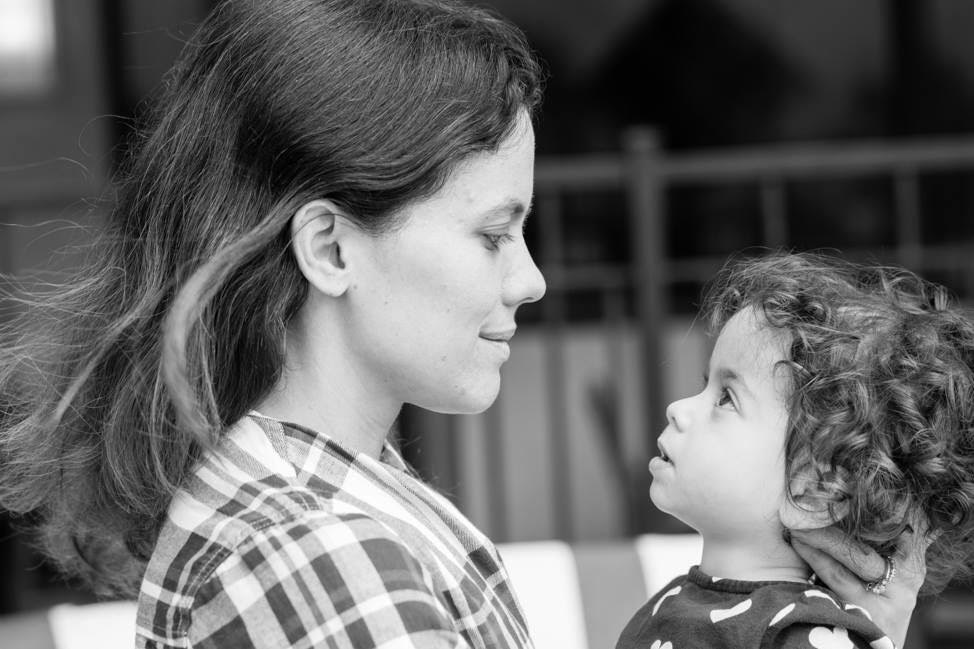5/13/2017
·Enable high contrast reading
Mothers are Warriors. But Some Battles Can’t Be Won.

 Mothers are warriors. Ultimate fighters taking on the world on behalf of their children. As the mother to three children I know this to be true. There is nothing I wouldn’t do, no obstacle I wouldn’t overcome for their benefit. I would gladly give my life if it meant one more day of theirs. Yet as the mother to a dying child, I know there are some battles that can’t be won even at that price.
Mothers are warriors. Ultimate fighters taking on the world on behalf of their children. As the mother to three children I know this to be true. There is nothing I wouldn’t do, no obstacle I wouldn’t overcome for their benefit. I would gladly give my life if it meant one more day of theirs. Yet as the mother to a dying child, I know there are some battles that can’t be won even at that price.
My third child, Talia, is dying from Tay Sachs, an incurable, untreatable disease. As we searched for an answer to why she couldn’t roll over, babble or even play with her toes, I heavily speculated as to which debilitating life-long disease Talia would have. I prepared myself for a lifetime as a caregiver to a medically fragile child. I prepared myself for fights with state agencies over intervention services, fights with medical insurance providers for treatment costs and fixated on finding residential care facilities for when Talia aged out of the child system. I couldn’t sleep thinking how aggressively I would fight for my child.
Then suddenly my family was confronted with a diagnosis that we knew meant certain death. This disease has been around for hundreds of years yet still lacks a viable treatment, though one has been sought for decades. It is, at least for the moment, a diagnosis free from hope. The fight I was preparing myself for had morphed into a guaranteed losing battle with death. The choice now was to determine our best path forward. Lack of the hope of survival also meant lack of hunting down doctors and miracle cures. In some ways it meant a freedom to focus on my daughter as a being, not a test subject. It forced me, and continues to challenge me, to accept Talia as she is now. The question now is for what we wish for her remaining days of life, and how we can best fight for it.
My husband is a cardiologist who has seen death up close. He has seen young people pass away unexpectedly and old people fight for every extra day; he has seen families shocked by sudden loss and families unwilling, or unable, to let their loved one go. He knows what a prolonged death looks like and he shares the stories of these anonymous people with me, sometimes quite unromantically in the middle of date nights. We both work together to process his day, to make sense out of other people’s tragic circumstances.
I’m grateful for his experiences and his willingness to share because, in a way, it has been good training for the tragic story we currently find ourselves in. When I look at Talia, I question the mysteries of life and death and feel the shock of our anticipated loss. While her disease is incredibly rare, making medical care decisions for an ultimately fatally sick family member unfortunately isn’t.
David and I engaged with a palliative care physician immediately upon diagnosis, and it’s something I wish every patient with a life limiting disease would do. In a typical doctor’s office they look at their patient from the perspective of their subspeciality. Meet with a gastroenterologist and they will counsel you on feeding tubes; meet with a pulmonologist and you’ll hear about home oxygen and pulse ox machines. Meet with a palliative care doc and you have the luxury of taking a step back to talk about your child’s life, to take time to reflect on your goals, and to make purposeful decisions as to their care. You help choose the path of when to intervene and of equal importance, when not to intervene.
My husband and I have a clear eyed vision of our approach to Talia’s demise and a have created a united plan for her remaining time with us. We are dedicated to ensuring that her journey will be free from the medical intervention which is designed to stave off the inevitable, focusing only on her current quality of life issues. We don’t plan on inserting a G tube, even though her body will someday lack the ability to ingest food orally. We don’t plan on medicalizing her short life on this earth in the hopes of getting a few more days, months or years with her. Those years, spent primarily as her caregiver rather than as her mom would be asking her body to hang on long after her mind wanted to be free. I choose to see Talia as she is: a beautiful girl with a terrible disease which is incompatible with life. Death, I’ve learned from palliative care doctors, doesn’t have to be painful. The decline of Talia’s body is guaranteed, the pain that that decline will cause her is the only thing we plan to assist.
In the absence of palliative care, or a good pediatrician who understands palliative care, the medical system can sometimes push parents along a path other than the one you might have chosen if you had had time to gain perspective. Once you’ve started down the longer medical trail, one decision rolls into another. If you get a G tube, then you’ve taken care of the nutritional aspect of your child’s death, and the next obvious step is to address her risk of infection, or her low oxygen intake, and before you know it, you’ve moved the entire hospital into your home and your baby is now your patient. If that is the course you’ve intended, then your path is clear and there’s support out there for you.
In our case, with an end that is free from doubt for Talia, we could feel justified in a minimal-intervention approach. While there are a few support structures in place for families who chose this route, the conflicting emotions and beliefs it roils up in people leaves this approach to be one that is not always openly discussed. I want to write Talia’s experience to provide a voice for families who are traveling this minimal intervention path, and especially for the families who didn’t even know this road existed.
The medical choices we make should be just that, choices. I feel fortunate to have had people in my life with medical backgrounds so we were well informed at the outset. Even with our knowledge we found ourselves in great need of our palliative care doctor and have had to be active, strong advocates for our daughter. I believe in the importance of pausing at the beginning of diagnosis and creating a space where patients, families and doctors have the time to discuss expectations and desires. Creating, and executing, a cohesive care plan is the only way for families to “survive” the process of dying.
(Carla keeps a beautiful blog at –thewarmweightoflove)


